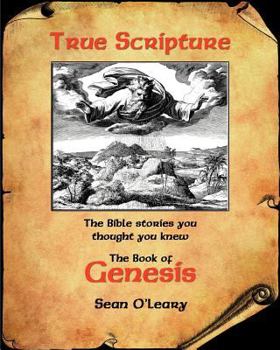True Scripture: The Book of Genesis: The Bible Stories You Thought You Knew
This situation is easily explained. For one thing, the Bible is not easy reading. Even newer translations written in more "modern" language tend to be long-winded, repetitious and puzzling. The chronology is hard to follow and passages are inserted seemingly at random. Some accounts contradict previous passages; other narrative segments are so confusing as to discourage any further reading.
Furthermore, priests, rabbis and ministers are tasked with expediting spiritual relationships with their God, not creating biblical scholars. In general, the clergy is unlikely to highlight such stories as Jephthah sacrificing his daughter on the altar to thank God for a military victory, Judah's daughter-in-law posing as a prostitute to trick him into fathering her children or Elisha summoning bears to kill forty-two children for the crime of mocking his bald pate.
True Scripture Point of View
True Scripture condenses what is written in the Bible into concise* and entertaining prose, including all of the surprising, amusing and sometimes disturbing details. The default standard is to take the Biblical text at face value and tell the story exactly as written. When this is impossible due to paradoxes, ambiguities or other glaring anomalies, True Scripture will generally address the problem and provide additional insight. With regard to painful components such as the genealogies, an explanation of the relevance of the material is provided, rather that an actual list of names.
In addition, easy to understand footnotes provide additional historical and linguistic perspectives for murky or ambiguous passages. As you read True Scripture, we invite you to follow along with your own Bible: nothing has been added or changed.
* Your total word savings over the King James Version is shown clearly at the beginning of each chapter.
The Book of GenesisIf you're looking for more Bible for your buck, there is no better value than the Book of Genesis. The first book of the Old Testament spans over half of the 4,100 year Biblical timeline, from Creation to the death of Joseph in Egypt in approximately 1675 B.C. That's over 2300 total years In Genesis, you will consider key questions such as: After God creates Man, why does He create Man again? Who are the mysterious warrior-giants known as Nephilim? Why does Noah sacrifice all the animals after saving them? Who are the imaginary helpers to whom God speaks on several occasions early in Genesis? Why couldn't God beat Jacob in a wrestling match? What was the ancient Hebrew concept of Hell? What was Judah's relationship with his daughter-in-law? How many Hebrew tribes are there supposed to be? Why were Jacob and Joseph mummified in Egypt? These stories and more are all found in the amazing Book of Genesis.





